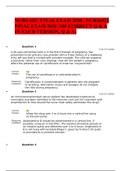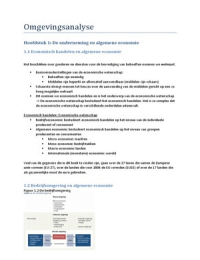-
1. Fiches de révision - Nurs 6521 final exam 2020 / nurs6521 final exam 2020 ( correct q & a in each vers...
-
2. Examen - Nurs 6521 midterm exam 2020 / nurs6521 midterm exam 2020 (100 correct q & a in each ...
-
3. Examen - Nurs 6521n midterm exam 2020 question and verified answers. advanced pharmacology &...
-
4. Examen - Nurs 6521 final exam 2020 / nurs6521 final exam 2020 (100 correct q & a in each versi...
-
5. Examen - Nurs 6521n final exam 2020 question and verified answers. advanced pharmacology alr...
-
6. Examen - Nurs 6521 midterm exam 2020 / nurs6521 midterm exam 2020 (100 correct q & a , total:...
-
7. Examen - Nurs 6521 midterm exam / nurs6521 midterm exam (latest versions, 2020) ( 100 q & a ...
-
8. Examen - &tab;nurs-6521d-6/nurs-6521f-6/nurs-6521n-6-advanced pharmacology midterm 2020 (100 corre...
-
9. Examen - Nurs 6521n week 11 exam / nurs6521n week 11 exam (latest-2020): complete solutions, 1...
-
10. Study guide - Nurs6521 week 10 quiz latest
-
11. Examen - Nurs 6521 week 11 final exam / nurs6521 week 11 final exam : advanced pharmacology: w...
-
12. Examen - Nurs 6521 final exam advanced pharmacology: walden university (verified answers)95 qu...
-
13. Examen - Nurs 6521 week 11 final exam / nurs6521 week 11 final exam : advanced pharmacology: w...
-
14. Examen - Nurs 6521 week 11 final exam / nurs6521 week 11 final exam : advanced pharmacology: w...
-
15. Examen - Nurs 6521 final exam (3 versions, 2020) / nurs 6521n final exam: (100 q & a in each v...
-
16. Examen - Nurs 6521 final exam ( 2020) / nurs 6521n final exam: (100 q & a )
-
17. Examen - Nurs6521d-6/nurs-6521f-6/nurs-6521n-6-advanced pharmacology 2019 winter final exam gr...
-
18. Study guide - Nurs 6521n advanced pharmacology quiz week 8 answers latest questions and answers
-
19. Study guide - Nurs 6521n advanced pharmacology quiz week 10 answers latest
-
20. Study guide - Nurs 6521n advanced pharmacology quiz week 9 latest
-
21. Study guide - Nurs 6521n advanced pharmacology quiz week 5 latest
-
22. Study guide - Nurs 6521n advanced pharmacology quiz week 4 latest
-
23. Study guide - Nurs 6521n advanced pharmacology quiz week 1 latest
-
24. Study guide - Nurs 6521n advanced pharmacology week 4 quiz latest
-
25. Study guide - Nurs 6521n advanced pharmacology quiz week 3 latest
-
26. Study guide - Nurs 6521n advanced pharmacology quiz week 6 latest
-
27. Study guide - Nurs 6521n advanced pharmacology quiz week 2 latest
-
28. Study guide - •&tab;nurs 6521n advanced pharmacology •&tab;quiz week 7
-
29. Examen - Nurs6521 / nurs-6521n-55 week 11, advanced pharmacology.2020 spring qtr 02/24-05/17-p...
-
30. Examen - Nurs 6521n-advanced pharmacology fall 2020/2021 week 8 quiz
-
31. Examen - nurs6521n / nurs 6521n advanced pharmacology weeek 6 midterm graded a
-
32. Examen - Nurs6521n-3/nurs-6521c-3-advanced pharmacology fall quarter week 10 graded a 2020/202...
-
33. Examen - Nurs6521 / nurs-6521n-14,advanced pharmacology fall quarter week 6 -quiz graded a 20...
-
34. Examen - Nurs 6521 midterm /nurs6521 advance pharm answers week 6 quiz 2020 fall graded a .all...
-
35. Examen - Nurs 6521 / nurs6521 advance pharmacology week 8 quiz graded a 2020/2021
-
36. Examen - Nurs6521n / nurs 6521n advanced pharmacology midterm exam latest graded a
-
37. Examen - Nurs 6521 week 11 final exam / nurs6521 week 11 final exam : advanced pharmacology: (...
-
38. Examen - Nurs6521 / nurs 6521n-32,advanced pharmacology. fall quarter week 7 latest graded a
-
39. Examen - Nurs 6521 / nurs-6521n-9,advanced pharmacology week 11 latest graded a
-
40. Examen - Nurs6521 / nurs 6521n advanced pharmacology week 11 final exam
-
41. Examen - Nurs6521 / nurs 6521 2020/2021 quiz - week 6/ midterm graded 28/30
-
42. Examen - Nurs6521 / nurs 6521 2020/2021 quiz - week 6/ midterm graded a+
-
43. Examen - Nurs6521 / nurs 6521 2020/2021 quiz - week 6/ midterm graded a+
-
44. Examen - Nurs6521n-15,advanced pharmacology. week 6 -quiz graded a+ 2020/2021 latest
-
45. Examen - Nurs6521 / nurs 6521 advanced pharmacology final exam / week 11 graded a+|latest revi...
-
46. Examen - Nurs6521 / nurs 6521 advanced pharmacology final exam / week 11 graded a+|latest revi...
-
47. Examen - Nurs6521 / nurs 6521 advanced pharmacology final exam / week 11 graded a+|latest revi...
-
48. Examen - Nurs6521 / nurs 6521 advanced pharmacology final exam/ week 11 |latest graded a++| do...
-
49. Examen - Nurs6521 / nurs-6521n-56,advanced pharmacology week 11 / final exam / graded a
-
50. Examen - Nur6521 / nurs-6521n-55, advanced pharmacology week 11 graded a+ 2021/2022
-
51. Examen - Nurs6521 / nurs-6521n-20,advanced pharmacology.2020 fall quarter 08/31-11/22-pt27
-
52. Examen - Nurs6521 / nurs-6521n-20,advanced pharmacology.2020 fall quarter 08/31-11/22-pt27
-
53. Examen - Nurs 6521 final exam 2020 graded a+ download to ace
-
54. Examen - Nurs6521n /nurs 6521n week 6 graded a+/ latest version.download to ace
-
55. Examen - Nurs6521n / nurs-6521n-20,advanced pharmacology.final exam /week 11 .latest rated a
-
56. Examen - Nurs-6521n-55, advanced pharmacology.2020 spring qtr week 11/final exam
-
57. Examen - Nurs6521 / nurs-6521n-55, advanced pharmacology final exam graded a ./week 11 exam .
-
58. Examen - Nurs 6521 / nurs6521 advanced pharmacology final exam
-
59. Examen - Final advanced pharmacology nurs6521/ nurs6521 week 11.2022/2023
-
60. Examen - Nurs6512 / nurs-6521n-55, advanced pharmacology final exam 2023/2024 reviewed
-
61. Examen - Nurs-6521n-31,advanced pharmacology week 11 final exam 2023/2024
-
62. Examen - Nurs 6521n-32,advanced pharmacology.2023/2024 scored 83 out of 100 points midterm exa...
-
63. Examen - Nurs 6521,advanced pharmacology midterm exam graded a
-
64. Examen - Nurs 6521 advanced pharmacology midterm exam
-
65. Examen - Nurs 6521 advanced pharmacology midterm exam latest graded a++
-
66. Examen - Nurs-6521c-2/nurs-6521n-2/nurs-6521d-2-advanced pharmacology week 7 2023/2024
-
67. Examen - Nurs-6521n,advanced pharmacology final exam
-
68. Examen - Nurs-6521n-56,advanced pharmacology.2023 week 11 final exam
-
69. Examen - Nurs-6521f-9/nurs-6521n-9/nurs-6521c-9-advanced pharmacology exam - week 11
-
70. Examen - Nurs-6521n-30-advanced pharmacology week 11 / final exam
-
71. Examen - Nurs 6521 advanced pharmacology midterm exam latest graded a++
-
Montrer plus





